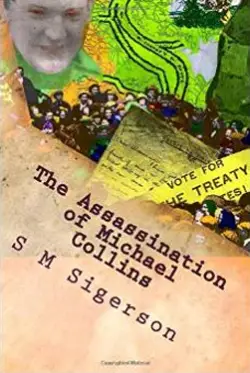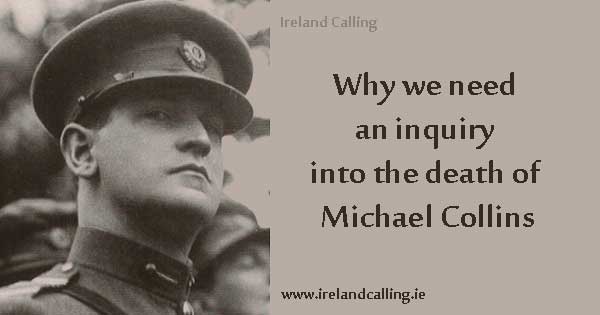By S M Sigerson
When he was shot in 1922, Michael Collins was poised to lead Ireland into a new era of national reconstruction. There is little doubt that his loss changed forever the young nation’s formative development, yet no record of any official inquiry into his death has come down to us. We still don’t know what happened. Who was responsible? It’s time for a full public inquiry so we can discover the truth.
The year: 1922. Against all odds, beyond the rebels’ “wildest dreams in 1916,” the mighty British Empire has capitulated. Independence, which the moral force of a small nation had long since won on paper, was now to become a reality. In six years, a virtual handful of gunmen had wrested it from a superior British military presence, which outnumbered them ten to one.
Michael Collins, youthful head-centre of the Irish Republican Brotherhood, chief strategist of these insurgents, was also an elected representative of the new, native government: member for South Cork, Minister of Finance and Director of Intelligence.
Conscripted to lead peace negotiations, he is also dead centre of ensuing controversy over the resulting Treaty. Although granting much that Ireland “had wanted these past seven hundred years,” the Treaty controversy turns to conflict, and conflict to civil war. A band of brothers is shattered into fraternal violence.
In August, Collins is on a short tour of his own county of Cork. Cheering crowds surround him at every stop. He assures friends, family, comrades, who greet him everywhere, “T’will soon be over … ” And confides to local commanders, “I’m going to put an end to this bloody war as quickly as possible.”
On a lonely road in West Cork, his own home territory … shots ring out. His military escort returns with just one casualty: the Commander-in-Chief himself. The man of the hour. The one the nation trusted; whom some have called “the most important man in Ireland.”
Why was he there? What was the purpose of his visit to Cork? Whom did he meet with? What was the name of each man in his escort? What did they say about the ambush? Was there an official inquest into his death? If so, what were its findings?
This is the sort of information one would expect to find at one’s fingers’ ends, on the first page of official records; certainly where the violent death of a nation’s Commander-in-Chief is concerned.
Yet over ninety years later, such questions have yet to be fully answered. No public inquiry was ever conducted. A few news clippings, wild rumours, secret testimony about burned files, … These are all we have to rely on; reducing the nation’s most disastrous loss of that period to little more than a folktale.
Some claim that a private inquest was held by the government or by the army at the time. If so, it was without the benefit of eye-witness testimony. “None of the escort with whom I spoke were questioned in any formal way or asked to attend an inquiry,” wrote John M Feehan, one of the greatest authorities on the death of Collins.
What of his many biographers? Certainly we have only them to thank for such studies as have been made.
Understandably, many chroniclers have tended to stick with questions they can answer; and to pass over those which prove hopelessly perplexing. This may be the most practical approach, for shorthand accounts in history books, film, documentary, and speeches.

But the devil is in the detail. Just one of those present when Collins died tends to be the most often quoted: Emmett Dalton of Collins’ convoy. As Free State general in charge of Cork, this was the one most personally responsible for the Commander-in-Chief’s safety there that day.
Yet many who were present at the ambush survived to tell their tale. Testimony from a number of these men, from both sides, has come down to us, however informally. They have one thing in common: practically every one contradicts Dalton’s version of what happened.
Still, can we call them witnesses? A witness is an uninvolved spectator, who can report what they saw, with some objectivity. As far as we know, the only ones present at Collins’ death were members of the Free State convoy, and the anti-Treaty ambushers. No one else was there. These were the participants, whose actions are in question. So none of them can be considered entirely disinterested.
Still, taken as a whole, they make one most telling point: no two accounts agree. Each and every one contradicts the others about what happened. And it is Dalton’s version which differs most widely from almost all others, on key points.
There is much to be learned from Michael Collins’ fate. Much which we have as yet failed to understand; a critical lesson of our history that’s been missed.
There is so much that could be done in this case now. Modern scholarship, forensic science, full disclosure of all relevant historical records, long hidden from public access, could enable us to clear up many questions, which have hung in the air since the day he fell.
As we look forward to the centenary of his death in 2022, it is to be hoped that the many people and institutions needed will rise to the occasion to carry this out, with the kind of complete, selfless cooperation called for.
